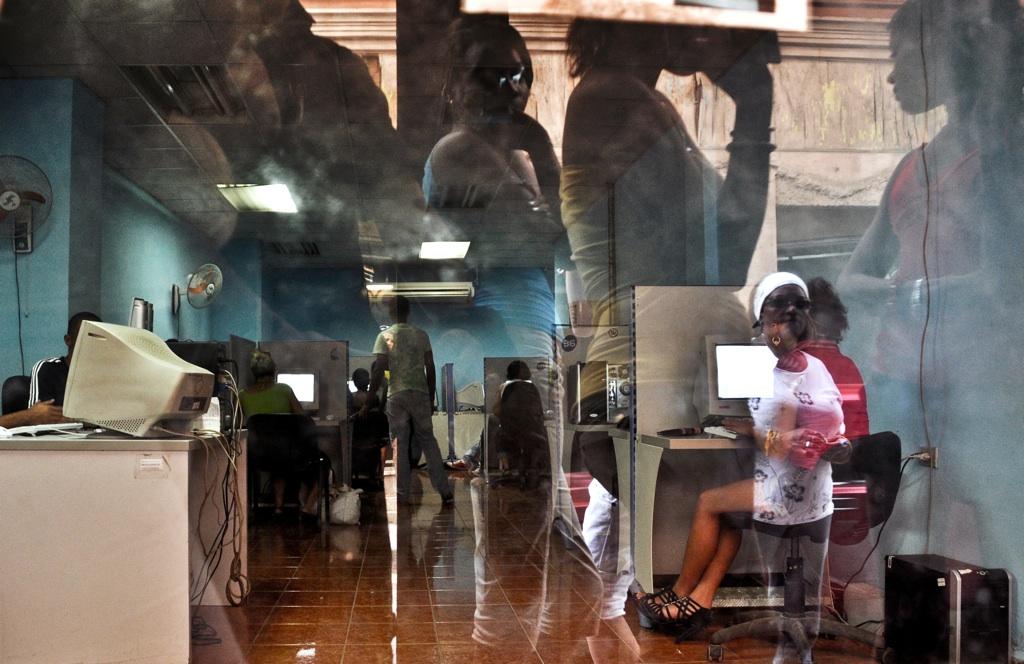Cuba jails US citizen Alan Gross
Cubans waiting to use the internet are reflected on the window while others go online use in an internet cafe in Havana, on February 7, 2011. U.S. citizen Alan Gross was sentenced to 15 years in jail for attempting to set up a satellite dish to allow unfettered access to the internet for Cuba’s small Jewish community.
HAVANA, Cuba — A decade ago, child castaway Elian Gonzalez was the singular focus of U.S.-Cuba relations, a six-year-old boy who became a proxy for the bitter divisions between Cuban families and the two Cold War foes.
Today the countries are locked once again in a custody battle, only this time the prize is a bearded 61-year-old American aid worker, Alan Gross. On Saturday, a week after his two-day trial, Cuban state media announced that Gross had been handed a 15-year prison term for trying to topple the Castro government by setting up “communications systems outside the control of authorities.”
Gross can hardly claim to be as innocent as Elian — though apparently not by much.
Gross spoke little Spanish and had no experience working in Cuba prior to his arrival, but he received $585,000 to carry out projects on the island for the U.S. Agency for International Development (USAID), which budgets $20 million a year “to promote a free and democratic society,” and “advocate for fundamental freedoms and free market-oriented solutions to meet the needs of Cuban citizens,” according to the agency’s web site.
Cuban authorities have long viewed such language as tantamount to calls for regime change, and the island’s ever-vigilant security agents took notice when Gross began making repeated trips to Cuba as a tourist. They arrested him in December 2009, as he tried to install satellite internet equipment that the U.S. government and his family insist were meant to give unfiltered web access to Cuba’s small Jewish community.
Gross has been through a wrenching ordeal since then, stuck in a Cuban jail cell while his 26-year-old daughter was diagnosed with breast cancer and had to undergo a double mastectomy. His 88-year-old mother is now sick with lung cancer. Gross’s wife said her husband has lost 90 pounds in his cell. Gross’s family was “devastated by the verdict and harsh sentence,” according to his American lawyer, Peter J. Kahn.
Gross can appeal his punishment to Cuba’s highest court, but if the sentence is upheld, the U.S. government will face the delicate task of trying to wrest him free from a country it has been at odds with since shortly after Fidel Castro came to power in 1959.
The Obama Administration has already ruled out swapping Gross for members of the Cuban Five, a team of Cuban intelligence agents serving long sentences in U.S. federal prisons who Havana champions as anti-terrorism heroes.
On Saturday U.S. officials reacted angrily to Gross’s sentence, calling the 15-year term “appalling.”
“He is guilty of nothing more than caring for the Jewish community and the people of Cuba,” said Gloria Berbena, spokesperson for the U.S. diplomatic mission in Havana, adding that the Cuba government “seeks to criminalize what most of the world deems normal — in this case, access to information and technology.”
State Department officials and U.S. legislators have repeatedly warned that relations with Cuba will remain lousy as long as Gross sits in jail. But even after Gross’s arrest, the Obama Administration continued taking measured steps to lighten half-century-old U.S. economic sanctions against the Castro government. This month, the Treasury Department authorized nine new U.S. cities and San Juan, Puerto Rico to begin operating charter flights to Cuba.
Some analysts speculate Cuba will soon release Gross on humanitarian grounds, having sent a clear message that the USAID programs will not be tolerated. Pardoning Gross wouldn’t bring praise to Havana, but would at least remove a major roadblock to better ties, they say, whereas keeping him locked up is of little strategic benefit in the long term.
There has been a subtle shift in the way Cuba’s state media have referred to Gross since his trial, increasingly depicting him as an unfortunate casualty of flawed U.S. policies. Gross’s trial was closed to foreign media, but government reports said he admitted to being “manipulated” by the U.S. government and his employer, Maryland’s Development Alternatives International, Inc, which has since shut down its Cuba programs.
Jewish groups and activists in the U.S., including the Rev. Jesse Jackson, have urged Cuban President Raul Castro to let Gross go home, with Jackson offering to mediate personally.
But Cuba may not be in such a forgiving mood. The Castro government has insisted in recent weeks that the American government is actively engaged in a cyber war against the island, trying to plant clandestine communication networks on the island to aid Castro opponents and stir unrest. And the USAID programs Cuba despises remain operational.
A Cuban government television program last week detailed the alleged efforts of another USAID-backed effort by the U.S. organization Freedom House to smuggle internet satellites onto the island, painting them to look like boogie boards.
Every day, reporters and producers at The World are hard at work bringing you human-centered news from across the globe. But we can’t do it without you. We need your support to ensure we can continue this work for another year.
Make a gift today, and you’ll help us unlock a matching gift of $67,000!
